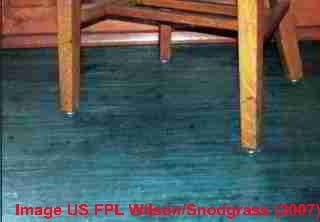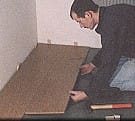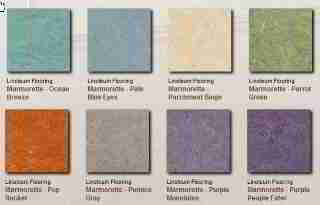 Modern Linoleum Flooring Materials
Modern Linoleum Flooring Materials
Contemporary linoleum flooring properties, designs, sources
- POST a QUESTION or COMMENT about the history, uses, & ingredients in linoleum rugs or sheet or linoleum tile floor coverings
Modern Linoleum Flooring Materials: what are the properties of currently-available linoleum flooring and who is currently selling linoleum floor coverings?
This article series provides information about linoleum flooring: the history of linoleum, linoleum ingredients, and the properties of linoleum resilient or sheet floor coverings.
InspectAPedia tolerates no conflicts of interest. We have no relationship with advertisers, products, or services discussed at this website.
- Daniel Friedman, Publisher/Editor/Author - See WHO ARE WE?
Current Linoleum Floor Covering Materials: history, ingredients, uses
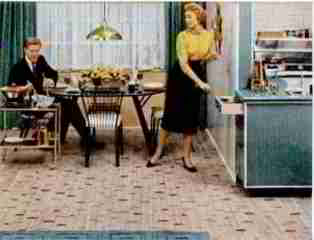 Linoleum was invented in 1860 by Frederick Walton and was intended for use first as a ship deck covering (battleship linoleum up to 1/2" thick).
Linoleum was invented in 1860 by Frederick Walton and was intended for use first as a ship deck covering (battleship linoleum up to 1/2" thick).
While sheet vinyl has replaced many older traditional linoleum floor coverings, linoleum, including in versions very similar to its original formula, are still sold and installed in buildings.
[Click to enlarge any image]
Article Contents
Current Linoleum Products
Linoleum was produced and is still produced today in solid colors, in a wood-grain pattern, in jaspsé (colored streak patterns), in marble-like patterns, in floral designs, in brick patterns, and in both printed geometric and inlaid geometric designs.
There are modern linoleum products that still use these traditional (non-asbestos-containing) ingredients, there were asphalt-saturated felt-backed linoleum-like products, and today there are both traditional linoleum and modern non-linoleum lookalike sheet flooring products made of vinyl.
The "linoleum" photographs shown above and just below illustrate two traditional linoleum floor patterns. Source: Wilson & Snodgrass, U.S. FPL (2007).
Watch out: But as we explain below, there are also sheet flooring products loosely referred to as linoleum that are adhered to a felt backer more broadly, Linoleum may be used as a generic term for a variety of both modern and older sheet floorings (sometimes incorrectly or at least confusingly).
Modern Linoleum Floors
Comparing historic linoleum with current products
For the last 50 years or so, linoleum has been used almost exclusively in commercial settings, but it is making a comeback in residential settings, due largely to its use of all-natural ingredients and reputation for durability.
Below is a linoleum catalog snippet showing modern linoleum patterns from Fobo Linoleum, Inc. (contact information for the company is given below)
Linoleum in its traditional or original formula was and is still made by boiling oil to form a thick cement paste that is mixed with pine rosin, wood flour, and other fillers such as clay or limestone to make a durable, resilient sheet flooring that wears well and resists indentation.
Jute Backing on traditional linoleum
The traditional backing for linoleum sheet flooring was typically jute fabric, a natural fiber. Other than relatively minor initial off-gassing from the linseed oil base, linoleum is considered nontoxic by most healthy-house advocates.
Linoleum (jute backed) is also naturally antimicrobial and anti static, making it well suited for hospitals, schools, and rooms with electronic equipment. If well maintained, a linoleum floor can provide a 20- to 30-year service life.
Description of contemporary linoleum flooring products
In response to new demand for the product in recent years, manufacturers have responded with a wide variety of solid and marbleized colors and attractive checkered patterns, available in sheet form as well as 19x19-inch tiles that can be mixed to create borders and other designs.
Unlike vinyl, linoleum colors go all the way through the product, making scratches and wear spots less noticeable than on vinyl. Also, scratches, cigarette burns, and other surface wear can be removed with steel wool or a nylon abrasive pad and buffed out.
However, since linoleum does not have a separate wear layer like vinyl flooring and is slightly porous, it requires somewhat more maintenance than vinyl. Applying a sealer or polish to the new floor will help it resist stains and make it easier to clean.
Also, portions of a linoleum floor not exposed to light will tend to darken or yellow due to the natural oxidation of the linseed oil base. This coloration will disappear upon exposure to light, and the original linoleum color will be restored, or “bloom.”
Where to Buy Modern Linoleum Flooring & Linoleum Flooring in Historic or Traditional Patterns
(also Rubber or Cork Flooring Alternatives)

Most if not all new linoleum flooring is now manufactured in Europe. Our linoleum sample color & pattern example at left is from the Armstrong Corporation's online linoleum flooring selection catalog. Contact information for Armstrong linoleum flooring products is just below.
Some of the linoleum and related cork or rubber flooring product sources listed below were listed by Wilson & Snodgrass - US FPL (2007).
All of the current (2014) Armstrong Corporation linoleum colors and patterns are variations of the pattern type shown here. Older braided rug or facsimile patterns are not currently offered in that company's selection guide.
- Armstrong Flooring Products
also distributes nearly seventy colors & patterns of linoleum flooring. Contact the company at: www.armstrong.com/flooring/linoleum.html for a web page listing a store-finder by U.S. zip code.
Armstrong World Industries, Inc. Customer Relations and Technical Services P.O. Box 3001 Lancaster, PA 17604, Tel: 1-800-233-3823 - DOMINION & Other CANADIAN FLOORING ASBESTOS - history of the Dominion Oilcloth & Linoleum Company, Canadian linoleum, sheet flooring, floor tiles, wall covering produced by Dominion & DOMCO, later Tarkett.
- Expanko, Inc.
1129 West Lincoln Hwy. Coatesville, PA 19320 Phone: 800–345–6202 Web site: http://www.expanko.com (rubber and cork flooring) - Flexco, Corp.
1401 East 6th St. Tuscumbia, AL 35674 Phone: 800–633–3151 Web site: http://www.flexcofloors.com/rubber_retro.asp (rubber, retro rubber, & vinyl flooring)
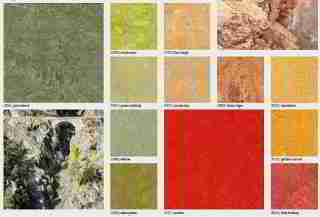
Image at left: example of Forbo linoleum in marbled pattern from the company's flooring catalog. Contact information for Forbo in North America and in the U.K. is just below.
- Forbo Linoleum, Inc.
The largest linoleum flooring supplier in the United States is European-based Forbo Linoleum, Inc., Forbo's Flotex sheet flooring (and floor tiles) are available in a wide range of colours and in linear, marbled, solid and other patterns. Forbo also provides cork-linoleum flooring products.
Forbo Flooring Systems 8 Maplewood Drive Humboldt Industrial Park Hazleton, PA 18202. TEL: United States 1-800-842-7839, Forbo Flooring Systems Canada Office 3220 Orlando Drive Mississauga, ON L4V 1R5, TEL: Canada English: 1-800-268-8108, Francais: 1-800-567-9268, Website: www.forboflooringna.com/ Email: info.na@forbo.com
Forbo Flooring in the U.K. can be contacted at London EC1 showroom (commercial enquiries only) 79 St John Street, Clerkenwell, London, EC1M 4NR Tel: 0207 553 9300, Residential enquiries: 0800 0935 846 , Website: http://www.forbo-flooring.co.uk
- Gerbert Limited,
119 South Tree Dr., P.O. Box 4944, Lancaster, PA 17604–4944
Phone: 800–828–9461, Website: http://www.gerbertltd.com/. Rubber & cork flooring - Linoleum City,
5657 Santa Monica Blvd. Hollywood, CA 90038 Phone: 800–559–2489 Web site: http://www.linoleumcity.com/products.htm (Historical patterns of linoleum, rubber, cork, & vinyl flooring)
Photo above: Nova cork plank flooring being installed.
- Nova Distinctive Floors
A unique floating linoleum plank floor that can be installed with or without glue is available from Nova Distinctive Floors.
Nova also produces cork flooring products, including an interesting Cork-Stone product, and leather flooring products (leather bonded to cork and high density fiber board). Forbo's Marmoleum linoleum flooring is provided in sheets or tiles.
Nova Distinctive Floors Address: 1710 E Sepulveda Blvd. Address: Carson CA, 90745 Phone: 866-576-2458 Fax: 310-830-9589 E-mail: sales@novafloorings.com Website: novafloorings.com/linoleumfloatingfloors.htm - Secondhand Rose,
138 Duane St. New York, NY 10013 Phone: 212–393–9002 Web site: http://www.secondhandrose.com/ (Used or "traditional" Linoleum) - Tarkett, Inc.
2728 Summer St. Houston, TX 77007 Phone: 800–877–8453 Web site: http://www.tarkett.com (Traditional or historic linoleum floor patterns, also vinyl flooring) - TARKETT, a TALE of ENTERPRENEURS, [PDF]
Tarkett USA, 2728 Summer St.
Houston, TX 77007
USA Tel: 800–877–8453
Website: tarkett.com (Traditional or historic linoleum floor patterns, also vinyl flooring)website: https://www.tarkett.com/ retrieved 2018/05/06, original source: https://www.tarkett.com/sites/default/files/Tarkett%20History%20Book.pdf
Website excerpt:
Tarkett Group leadership is the result of 130 years of flooring experience, thanks to the talent, values and commitment of generations of entrepreneurs.
Initially known as Allibert and Sommer, the company’s story begins with the ideas, energy and commitment of its founding entrepreneurs. - tarkett.com/en/content/history
Readers interested in other natural product resilient floor coverings should also see CORK FLOORING: Natural Alternatives to Vinyl Floors: Installing Cork or Cork Tile Floors.
Reader Q&A
Question: can I still buy traditional linoleum flooring?
Is it possible to purchase traditional (linseed oil, cork, jute) linoleum in the USA or by shipment from other sources? Any technical specs available and vendor info would be most appreciated. - Anonymous by private email 2023/10/01
Moderator reply:
Yes indeed. On our home page for this topic
you will find this link:
WHERE TO BUY LINOLEUM, RUBBER, CORK FLOORS
...
Continue reading at CONGOLEUM-NAIRN FLOOR TILES & LINOLEUM or select a topic from the closely-related articles below, or see the complete ARTICLE INDEX.
Or see these
Recommended Articles
- CONGOLEUM-NAIRN FLOOR TILES & LINOLEUM
- FLOOR, RESILIENT VINYL or CORK
- IDENTIFY SHEET FLOORING TYPE
- LINOLEUM & OTHER SHEET FLOORING
- FLORAL PATTERN LINOLEUM & SHEET FLOORING
- LINOLEUM FLOOR HISTORY
- LINOLEUM ASBESTOS CONTENT?
- LINOLEUM, ASBESTOS FREE - Congoleum Gold Seal & Others
- LINOLEUM FLOOR INGREDIENTS
- LINOLEUM FLOORING RESTORATION & REPAIR - Conservation resources
- LINOLEUM "LOOKALIKES" ADHERED to FELT
- MODERN LINOLEUM FLOORS
- WHERE TO BUY LINOLEUM, RUBBER, CORK FLOORS
- RESILIENT SHEET FLOORING ID GUIDE
Suggested citation for this web page
MODERN LINOLEUM FLOORS at InspectApedia.com - online encyclopedia of building & environmental inspection, testing, diagnosis, repair, & problem prevention advice.
Or see this
INDEX to RELATED ARTICLES: ARTICLE INDEX to BUILDING FLOORING
Or use the SEARCH BOX found below to Ask a Question or Search InspectApedia
Or see
INDEX to RELATED ARTICLES: ARTICLE INDEX to BUILDING INTERIORS
Or use the SEARCH BOX found below to Ask a Question or Search InspectApedia
Ask a Question or Search InspectApedia
Questions & answers or comments about linoleum floor coverings, age, history, safety, materials, contents.
Try the search box just below, or if you prefer, post a question or comment in the Comments box below and we will respond promptly.
Search the InspectApedia website
Note: appearance of your Comment below may be delayed: if your comment contains an image, photograph, web link, or text that looks to the software as if it might be a web link, your posting will appear after it has been approved by a moderator. Apologies for the delay.
Only one image can be added per comment but you can post as many comments, and therefore images, as you like.
You will not receive a notification when a response to your question has been posted.
Please bookmark this page to make it easy for you to check back for our response.
IF above you see "Comment Form is loading comments..." then COMMENT BOX - countable.ca / bawkbox.com IS NOT WORKING.
In any case you are welcome to send an email directly to us at InspectApedia.com at editor@inspectApedia.com
We'll reply to you directly. Please help us help you by noting, in your email, the URL of the InspectApedia page where you wanted to comment.
Citations & References
In addition to any citations in the article above, a full list is available on request.
- Armstrong ® Residential Flooring - Website 05/15/2010 https://www.armstrongflooring.com/ lists current flooring products provided by the Armstrong Corporation, including Armstrong's current vinyl floor tile products at https://www.armstrongflooring.com/flooring/products/vinyl-floors
- In addition to citations & references found in this article, see the research citations given at the end of the related articles found at our suggested
CONTINUE READING or RECOMMENDED ARTICLES.
- Carson, Dunlop & Associates Ltd., 120 Carlton Street Suite 407, Toronto ON M5A 4K2. Tel: (416) 964-9415 1-800-268-7070 Email: info@carsondunlop.com. Alan Carson is a past president of ASHI, the American Society of Home Inspectors.
Thanks to Alan Carson and Bob Dunlop, for permission for InspectAPedia to use text excerpts from The HOME REFERENCE BOOK - the Encyclopedia of Homes and to use illustrations from The ILLUSTRATED HOME .
Carson Dunlop Associates provides extensive home inspection education and report writing material. In gratitude we provide links to tsome Carson Dunlop Associates products and services.


